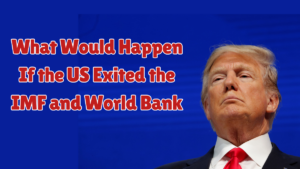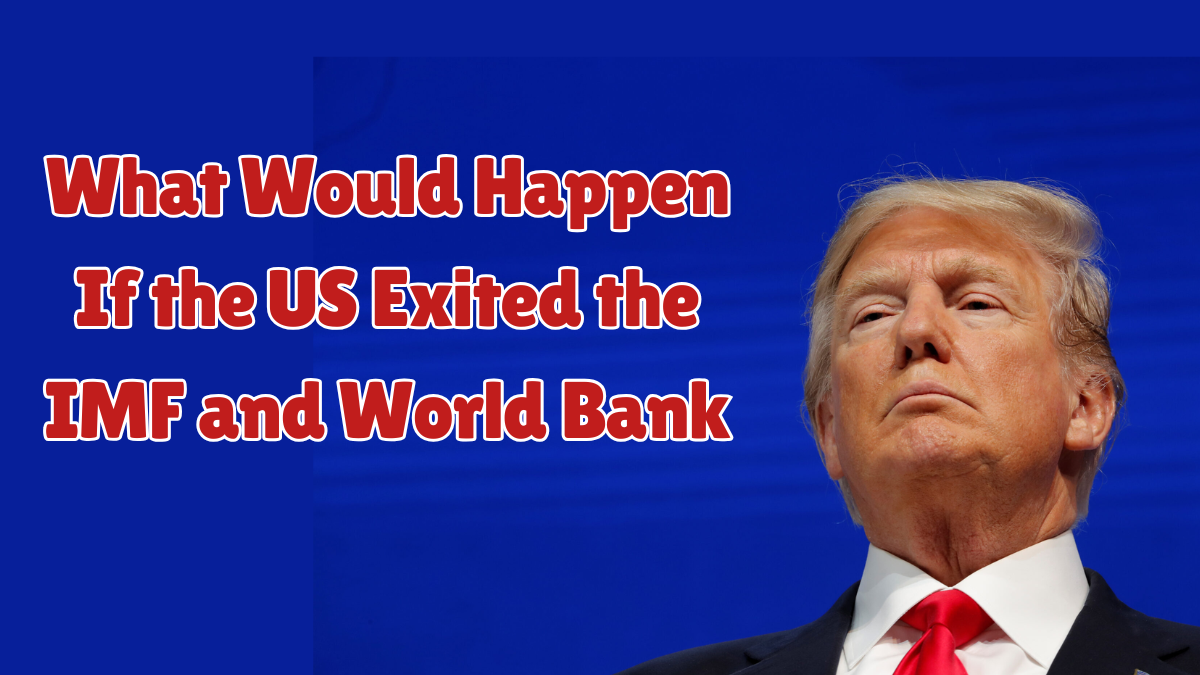The United States plays a pivotal role in the functioning of the International Monetary Fund (IMF) and the World Bank, two of the most influential financial institutions globally. Both institutions play an essential part in managing global economic stability, providing loans, grants, and financial advice to developing nations. But what if the US were to withdraw from these organizations? In this article, we break down the potential consequences of such a move and how it could reshape the global financial system.

US Role in the IMF and World Bank
The IMF aims to promote international monetary cooperation and exchange rate stability, facilitate balanced growth of international trade, and provide resources to countries in financial distress. As the largest shareholder of the IMF, the US holds roughly 16.5% of the voting power, which provides it significant influence over decisions, including lending policies and financial programs.
World Bank: A Major Contributor to Global Development
The World Bank provides loans and grants to developing countries for projects in sectors such as infrastructure, healthcare, education, and poverty reduction. As the largest donor, the US holds a substantial share of votes, helping to set the institution’s development agenda and shaping the priorities of the International Development Association (IDA).
What Would Happen If the US Withdrew from the IMF and World Bank?
1. Shift in Global Economic Power
A US withdrawal would trigger a shift in global economic power, especially within the IMF and the World Bank, where the US has long held significant influence.
-
IMF Voting Structure: The US holds a major voting share, so its exit would result in a shift in decision-making. Countries like China, India, and the European Union could become more influential in global financial policies.
-
World Bank Governance: Without the US, China and other emerging economies might increase their control over global development policies, altering the focus and priorities of the World Bank.
2. Loss of Stability and Credibility in Global Finance
The US withdrawal would diminish the credibility and financial stability of both the IMF and the World Bank, as the US’s financial backing is crucial for their functioning.
-
Potential Funding Gaps: Without the US’s financial contributions, there may be funding shortages, making it harder for these institutions to support financial programs, particularly in developing countries.
-
Weakened Global Financial Stability: The US’s role in ensuring global stability could be replaced by competing global powers, such as China, leading to a fragmented financial system.
3. Disruption in Global Development Projects
The World Bank is instrumental in funding development projects worldwide. A US exit could have significant implications for ongoing and future projects.
-
Decreased Funding for Development Initiatives: Key sectors like infrastructure, education, and poverty alleviation could face financial setbacks due to a lack of resources, hindering development in poorer nations.
-
Impact on Low-Income Countries: The World Bank has been vital in financing programs to alleviate poverty in low-income nations. US withdrawal could disrupt these efforts, delaying or halting key initiatives.
4. Emergence of Rival Institutions
With the US withdrawal, new financial institutions could rise to fill the vacuum left behind, particularly those led by emerging economies like China and India.
-
China’s Increasing Influence: China has already established institutions like the Asian Infrastructure Investment Bank (AIIB) and BRICS New Development Bank. Without the US, China could further expand its global financial influence.
-
Strengthening BRICS: The BRICS nations (Brazil, Russia, India, China, and South Africa) may push for a financial system that’s less reliant on US-led institutions, shifting global development priorities.
5. Political and Diplomatic Ramifications
The US’s withdrawal would signal a shift towards isolationism, undermining its diplomatic influence in global economic matters.
-
Deteriorating Global Leadership: The US would lose significant leverage over global policy and decision-making, potentially damaging its diplomatic relations with both allies and developing nations.
-
Rival Powers Gaining Influence: Countries like China, Russia, and even the European Union could use the opportunity to increase their influence within global financial institutions.
6. US Dollar’s Continued Dominance
Despite a US exit from the IMF and the World Bank, the US dollar is likely to maintain its status as the world’s reserve currency, ensuring its continued dominance in global finance.
-
Dollar’s Role in Global Trade: The US dollar remains the primary currency for international trade and foreign reserves, meaning the global financial system would still rely on it, even without US involvement in the IMF and World Bank.
-
Impact on Global Markets: Although the IMF and World Bank would face challenges, the US dollar’s dominance would help maintain stability in global markets.
Possible Alternatives and Future Scenarios
1. Strengthened Regional Financial Institutions
Regional financial institutions could gain importance in the absence of the US, especially those backed by China and other emerging economies.
-
Asian Infrastructure Investment Bank (AIIB): AIIB, led by China, could provide infrastructure financing in Asia and beyond.
-
New Development Bank (NDB): The BRICS countries’ New Development Bank could expand its role in financing development projects in emerging markets.
2. Increased Cooperation Among Emerging Economies
Without US leadership, emerging economies could form stronger alliances to create a more balanced financial system. However, this could lead to further fragmentation in global economic governance.
- BRICS Group Strengthening: The BRICS nations could expand their financial and policy influence, promoting their own lending frameworks and development strategies.
3. Continued US Global Financial Influence
Even if the US were to withdraw, it would remain a dominant force in the global economy, especially due to the US dollar’s role as the world’s primary reserve currency.
- Ongoing Economic Power: The US would still hold significant sway in international trade, foreign investment, and global financial markets, mitigating some of the challenges caused by its exit from these institutions.
Conclusion
The possibility of a US withdrawal from the World Bank and the IMF would have far-reaching consequences for both global financial stability and the governance of international economic systems. While the US has maintained its dominance in these institutions for decades, such a move would create opportunities for other nations, particularly China, to assert their influence.
For now, the US remains integral to global financial institutions, but its future role in these organizations will depend on political dynamics and global economic trends. Regardless of the outcome, the world is likely to see shifts in economic power, new financial alliances, and the rise of alternative institutions in the coming decades.
Frequently Asked Questions
1. What would happen if the US withdrew from the IMF and World Bank?
A US withdrawal would shift global financial power, reduce the effectiveness of these institutions, disrupt global development projects, and lead to increased influence from emerging economies like China.
2. How does the US contribute to the IMF and World Bank?
The US is the largest shareholder in both the IMF and the World Bank, contributing significant financial resources and holding substantial voting power to influence decisions and policies.
3. Could China replace the US in global financial institutions?
China is expanding its influence through institutions like the Asian Infrastructure Investment Bank (AIIB) and BRICS New Development Bank, which could increase their role in global finance if the US withdraws.
4. Would the US dollar lose its dominance if the US withdrew from the IMF and World Bank?
No, the US dollar would likely continue to dominate global trade, investment, and reserves, even without the US’s involvement in these institutions.
5. How would global development projects be affected by a US withdrawal?
Many global development projects, particularly those funded by the World Bank, could face funding shortages and delays due to a lack of US financial support, affecting poverty alleviation and infrastructure development in poorer countries.
Click here to learn more.
Pari is a passionate writer known for captivating stories that blend imagination and reality. Inspired by travel, history, and everyday moments, Pari crafts narratives that resonate deeply with readers.
